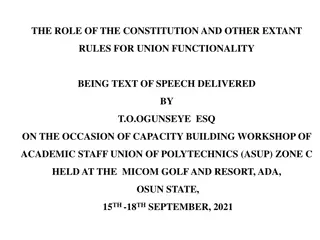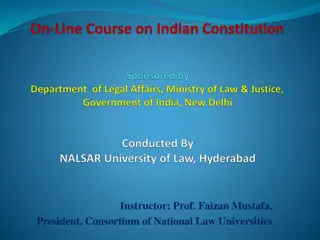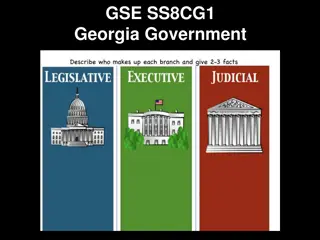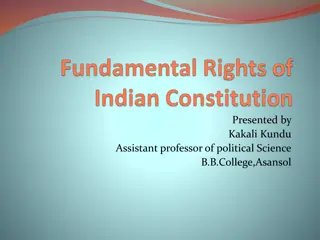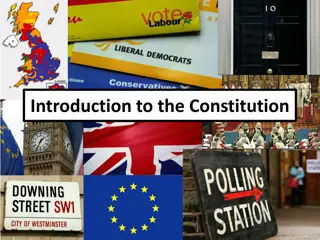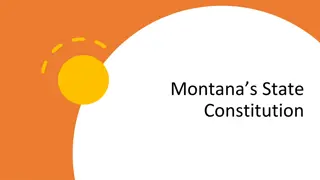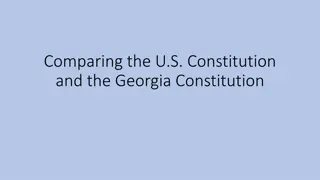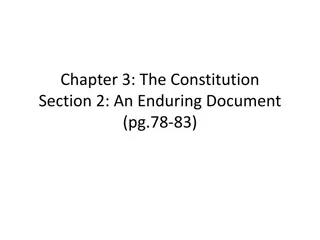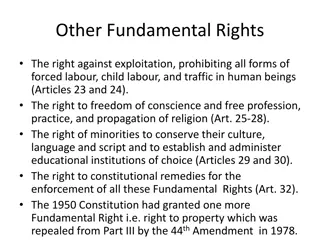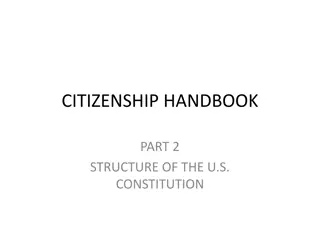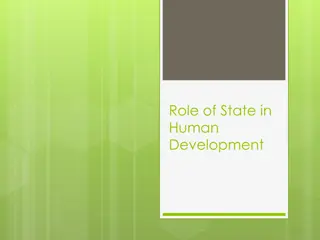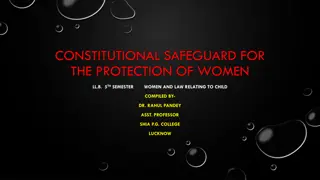Understanding Fundamental Rights in the Constitution
Fundamental rights in the Constitution establish limits on government powers, ensuring democratic systems. They include both positive and negative rights, accessible to citizens and non-citizens but subject to restrictions in certain contexts. Violations of these rights can be challenged in courts, and they are justiciable, with exceptions during emergencies. These rights are amendable following constitutional procedures and encompass both individual and group protections.
Download Presentation

Please find below an Image/Link to download the presentation.
The content on the website is provided AS IS for your information and personal use only. It may not be sold, licensed, or shared on other websites without obtaining consent from the author. Download presentation by click this link. If you encounter any issues during the download, it is possible that the publisher has removed the file from their server.
E N D
Presentation Transcript
Nature and Significance of Fundamental Rights The constitution is a document that sets limits on the powers of the government and ensures a democratic system in which all persons enjoy certain rights. Fundamental rights, embodied in Part III of the Constitution guarantees to each citizen basic substantive and procedural protections against the state. They can be categorized in to two types: positive and negative. Negative rights are those, which limit state action and prohibit the state from doing certain things-e.g. Art. 14, which states, The state shall not deny to any person equality before the law or equal protection of laws within the territory of India. Positive rights, on the other hand, are those rights that permit a citizen to enjoy certain freedoms-e.g. Art. 19, which gives the right to freedom.
Citizens Vs Non-citizens Some of the rights like equality before law and equal protection of laws (Art. 14), protection of life and personal liberty (Art. 21), protection in respect of conviction for offences (Art.20), free and compulsory education for all children of 6-14 years (Art.21 A), Protection against arrest and detention in certain cases (Art.22), freedom of religion (Art.25-28), etc are available to all persons whether citizens or not. But rights like the right to equality of opportunity in employment (Art.16), protection from discrimination on grounds only of religion, race, caste sex and place of birth (Art.15) and freedom of speech and expression, assembly, association, movement, residence and profession (Art. 19).
Neither Universal Nor Absolute Fundamental rights are not universal in application. Some of the fundamental rights and the extent of their enjoyment can be restricted or even abrogated by Parliament under Art. 33. Thus the rights of the citizens in the armed forces or the forces in charge with the maintenance of public order can be restricted or abrogated. Fundamental rights are not absolute as they are clearly defined in their scope as well as limitations. The prescribed limitations are in the interest of public good, social reforms, public order, morality and the safety of the state. The constitution allows the state to impose reasonable restrictions on certain rights, but the reasonableness of the restrictions is a justiciable matter.
Granted to Individuals as well as to Groups Right to freedom of religion and cultural and educational rights incorporate the rights of the minorities. Abolition of untouchability is also a group right. Thus, rights are not only against the state but also against individuals in certain cases. Rights are amendable, but this amendment has to be according to the procedure established by the Constitution itself.
Fundamental Rights are Justifiable If any of these rights is violated, the individual affected is entitled to move the Supreme Court or High Court for the protection and enforcement of her/his rights. Fundamental rights can also be suspended during an emergency, except the right to life. Apart from fundamental rights, there are two other kinds of rights flowing from other parts of the Constitution: Constitutional rights and legal rights. i. Constitutional rights are created by imposition of restrictions upon the state on its claims upon the citizens-e.g. Art. 265 forbids levying and collection of taxes except by the authority of law; Art. 300A provides that no person shall be deprived of her/his property save by the authority of law. ii. Legal rights flow from statutes based upon the Constitution but not directly from it. A legal right is created by an ordinary law and can be taken away by changing the law.
Rights in Indian Constitution Vs. those in the US Constitution The US Constitution states the rights in a very crisp and unqualified language. The conditions or the limits on the rights are not mentioned in the constitution. It is the judiciary which elaborates the limitations or places conditions on the rights stated in the constitution. On the other hand, in the Indian Constitution most of the fundamental rights are stated in qualified terms, like subject to public order , social reforms and morality . Though there is a very limited role for judicial determination, nonetheless the judiciary is frequently required to interpret the articles on fundamental rights in the light of the qualifications attached to them. Another difference is that while the Indian Constitution provides for both individual and group rights its American counterpart grants only individual rights. The constitution makers of the USA were guided by the 18th century laissez faire doctrine but the constitution makers of India were guided by the welfare philosophy of the 20thcentury that held social control over individual rights as essential.
Scope of State Intervention Although fundamental rights are mostly against arbitrary state intervention there are also some rights which are against social discrimination among people-e.g. Art.17 and Art.23. The state is enjoined to lend its authority in favour of the victims of exploitation and discrimination and uphold the right against exploitation. The state has also been authorized by the Constitution to take special measures for public purpose, social reform, and the welfare of the weaker sections like women, children, members of the backward classes, the SCs and the STs. Amendments of the Constitution, in this context, have led to the widening economic opportunities of the socially, economically, and educationally backward classes.
Scope and Limits of Fundamental Rights The Constitution of India declared, at the time of the commencement of the Constitution, that all the laws in operation would continue to remain in force only if they conformed to and were consistent with the fundamental rights guaranteed in Part III of the Constitution-e.g. Art.13. Art. 32-Right to constitutional remedies strengthens the two-fold prohibition (Art. 13) through which the Supreme Court is empowered to issue writs for the enforcement of the fundamental rights which is available to any person. Parliament can however, modify the application of the rights to members of the armed forces or the forces in charge of maintenance of public order, or the branches dealing with intelligence and telecommunications as they deal with sensitive subjects-e.g. power to the Parliament by Art. 33.
Right to Equality-Articles 14 to 18 According to Art.14, the state shall not deny to any person equality before the law or equal protection of laws within the territory of India . The equality before law , which is a British concept (Rule of Law), means that the laws will be equally administered and that there shall not be any discrimination between persons. Everyone is equal in the eyes of law. Negatively, it would mean absence of privilege or discrimination. Equal protection of law on the other hand, which is an American doctrine, means application of law equally in the like situation. This means subjection to equal laws applying alike to all in the same situation. If the conditions and situations are different for one group of persons from others then a differential law for them should not be deemed unconstitutional provided there is a reasonable basis for differential treatment.
Equal Protection of Law: Classification on Intelligible Differentia Since equality does not mean identical treatment the state may classify persons for purposes of legislation. But this classification should be on reasonable grounds and it should not be arbitrary. This classification should be founded on intelligible differentia, which distinguishes those who are grouped together from others and this differentia should have a rational basis to the object sought to be achieved by law. Articles 15, 16, 17 and 18, broadly relate to socio- economic equality. Besides, unlike Art.14 they apply only to citizens of India.
Equality of Status and Equality of Opportunity: Affirmative Action All sections of the society enjoying equal opportunities in a society where there are various kinds of social inequalities is problematic. So the Constitution clarifies that the government can implement special schemes and measures for improving the conditions of certain sections of society: children, women, and the socially and educationally backward classes.




